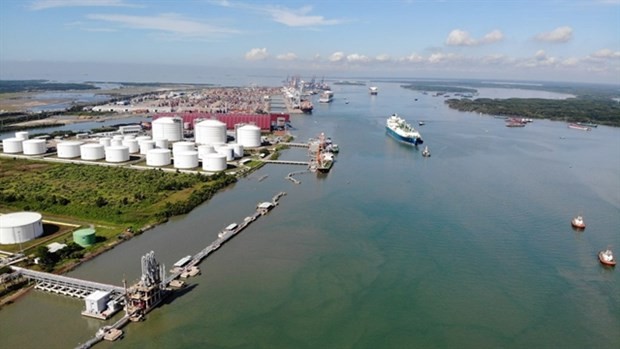
Coal-fired to gas-fired power generation helps ensure energy security: MOIT
Latest
 |
| An LNG shipment arrives at the Thi Vai Port Complex in southern Vietnam (Photo: VNA) |
According to the Ministry of Industry and Trade (MoIT), several coal-fired power projects are awaiting approval to transition into projects utilising LNG. Several provinces, including Thanh Hoa, Nghe An and Quang Tri, have voiced their opposition to additional coal-fired plants in favour of gas-fired plants.
As the country's hydropower reaches its maximum capacity and soaring demand for electricity in the coming decades, the development of gas-fired power electricity plants will play a vital role in ensuring electricity supply for the economy, as well as realising the gradual transition to cleaner energy in Vietnam.
According to a recent report by the MoIT, there are currently five coal-fired power projects facing delays and difficulties in securing capital: Vinh Tan III Thermal Power Plant (1,980 MW), Song Hau II Thermal Power Plant (2,120 MW), Quang Tri Thermal Power Plant (1,320 MW), Cong Thanh Thermal Power Plant (600 MW), and Nam Dinh I Thermal Power Plant (1,200 MW).
The investor of the Quang Tri Thermal Power Plant project, Thailand International Power Company (EGATi), has officially announced the suspension of the project. Regarding the Cong Thanh Thermal Power Plant project, located in Thanh Hoa province, its investors - Cong Thanh Group and the province are seeking approval to convert it into an LNG power project.
A British Petroleum (BP) representative said the group has been in discussion with the Cong Thanh Group on the possibility of collaboration on an LNG power plant, along with two other international partners.
"The proposed project with Cong Thanh aligns with BP's sustainable goals, including providing cleaner energy for the economy and supporting the communities where we operate," said the representative.
According to Dau Tu (Investment) Newspaper's exclusive source, General Electric (GE) is currently engaging in technical discussions on the project and is ready to participate if cooperation opportunities arise.
Meanwhile, according to industry insiders, the conversion of the Cong Thanh Thermal Power Plant into an LNG project, if approved, could become a model for other projects, which have been experiencing delays.
Regarding the issue, Lam Nguyen Phuong Thao, a lawyer at Russin&Vecchi Vietnam Company, believed that if approved, this could become a model for other delayed projects.
Thao said the conversion would create hundreds of jobs in construction, engineering and infrastructure while reducing the country's dependence on imported coal.
On the other hand, upfront costs, including LNG infrastructure and a stable supply source, must be readily available. The pros, however, will likely outweigh the cons.
"This is a necessary step in Vietnam's transition to a cleaner and more sustainable energy future," she said.
In a recent exchange with the press, Minister of Industry and Trade Nguyen Hong Dien said the development of LNG power projects is for ensuring electricity supply for economic and social development in the 2021-2030 period and beyond.
He said the ministry has been in close contact with investors and local authorities to discuss matters related to the impact on electricity prices, the capacity of project investors, and the technical conditions for project conversion.
John Rockhold, Head of the Electricity and Energy Working Group of the Vietnam Business Forum, said the conversion of coal-fired projects into gas-fired ones is a crucial step in the development of power sources in Vietnam.
The reason is that LNG has up to 50% lower carbon emissions compared to coal, and credit institutions are tightening funding for coal projects to meet international commitments on emission reduction. He emphasises the importance of infrastructure, deep-water ports, electricity prices, and, especially, government guidance in ensuring successful conversions.
Dr Ngo Duc Lam, former Deputy Director of the Energy Institute under the MoIT, said that accelerating the conversion of coal projects, especially those with existing infrastructure, will help address demand for the country's power-hungry northern regions.

























